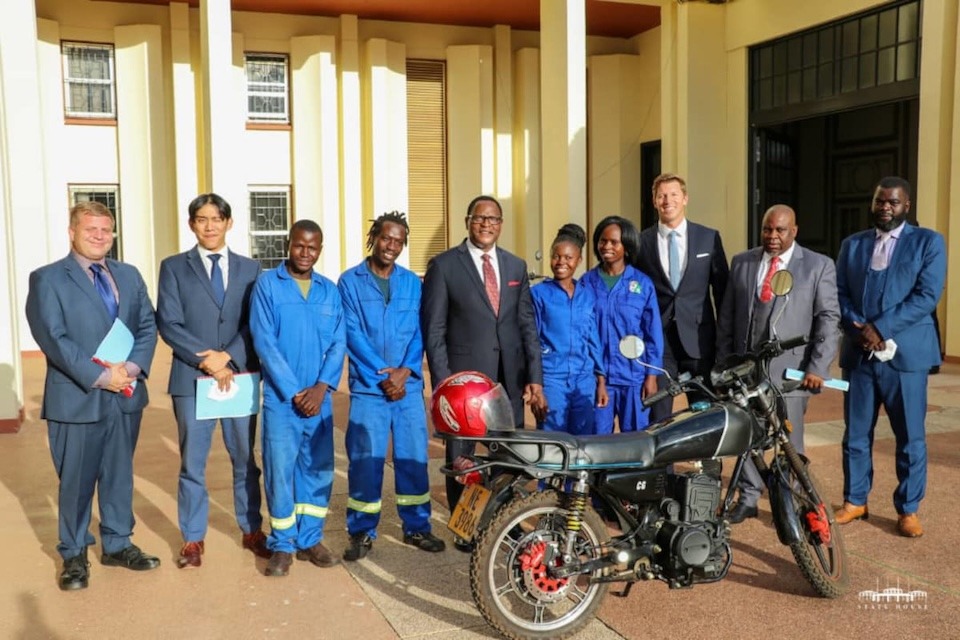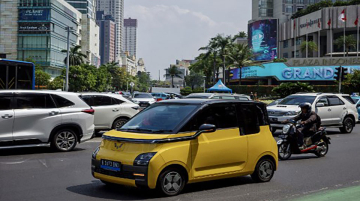
For years, Malawi, the world’s fourth-poorest country, has suffered from chronic fuel shortages. However, in a sunbaked workshop on the outskirts of the capital, Lilongwe, a team of local electric vehicle (EV) technicians is working to overcome this anomaly.
Huddled around a disassembled electric motorcycle and utilizing Chinese EV technology, the Sanguo Ventures (SGV) team carefully fits a lithium battery into the chassis, one of several such bikes being assembled here each month.
The company was founded in 2017 by Americans Evan Liu and Colin Sargent. The two conceived the idea of providing mobility solutions during a visit to Malawi.
“We came to Malawi initially on an exploratory trip, actually with no particular agenda in mind. And we were stunned by the opportunity and almost the lack of knowledge from everyone else about Malawi,” Liu, a supply chain specialist, says.
Figuring that it gave them considerable leverage in terms of a first-mover advantage, given that Malawi was underinvested in the transport sector, the two got to work on their idea and incorporated the company. They then began assembling the bikes, which cost $2,800, a price that is out of reach for many Malawians, whose average monthly salary is $180.
To address this challenge, SGV partnered with institutions instead of individuals.
Liu says that before commercially launching their electric motorcycles into the market, they conducted an initial 500,000-kilometer case study with their first partner and customer, Proteligent Security Services, one of Malawi’s largest security companies. SGV has then grown to include other institutional customers and has already deployed more than 300 units across Malawi, collectively logging 5 million kilometers without a single warranty claim.
The Chinese Backbone: Batteries, Motors, and Know-How
SGV’s success was built on the back of Chinese EV technology despite the U.S. being a manufacturer.
Liu says, “The U.S. doesn’t make lithium batteries for vehicles; China does. The decision to opt for Chinese-made components was an acknowledgment that the African market is highly price-sensitive. So you have to be able to deliver a solution for a relatively affordable price.”
He added that the other reality is that the Chinese market is the only one that has made the necessary investments to create the infrastructure and a production capability and capacity of something of relatively good quality and for a relatively reasonable price.
SGV imports battery cells and motors from Kunming Passenger Automobile Company, a Chinese firm that also supplies parts to BYD and SAIC. These components are then shipped to Malawi, where local technicians, many of whom are fresh out of vocational schools, assemble the bikes.
“We strip down every bike to its bare metal and rebuild it here,” Liu said. “It’s the only way to ensure our team understands the technology inside out.”
The strategy has paid off. SGV’s flagship SGV150 model, designed for Malawi’s potholed roads and frequent blackouts, boasts a three-year warranty on its drivetrain.

Training the Next Generation of African EV Technicians
Beyond assembly, SGV has also invested in skills transfer. The company partners with Don Bosco Youth Technical Institute and Lilongwe Technical College, offering apprenticeships to students pursuing automotive certifications.
“We have 42 employees, and aside from me and my co-founder, all are Malawian,” Liu noted, adding that the average age of SGV’s workshop staff is 24.
This focus on training is strategic. With EVs still new in Malawi, SGV needs a local workforce capable of maintaining its growing fleet. “You can’t sell a product if no one can fix it,” Liu adds.
Overcoming Policy and Financing Hurdles
SGV’s rise hasn’t been easy. When the company launched in 2017, Malawi slapped 114% import duties on EVs, a barrier that took years of lobbying to overturn. Even now, financing remains a significant challenge, especially for most motorcycle taxi operators who are SGV’s target market since they are unbanked and lack collateral. To bridge the gap, SGV is piloting a lease-to-own program with local microfinance institutions, leveraging the bikes’ low operating costs to justify loans.
“A petrol bike costs 25,000 Kwacha ($15) a day in fuel. Our bikes cost $1.80 to charge,” Liu says. “That math sells itself.”
The Coming Competition And The Road Ahead
While the company has enjoyed the first-mover advantage, it won’t be alone for long. Many rivals are seeking a piece of the motorcycle transport pie with Transsion, the Chinese tech giant behind Tecno and Infinix phones, planning to dominate Africa’s e-bike market by 2025 with its TankVolt brand. But Liu remains unfazed.
“Others might sell cheaper bikes, but they won’t have our local repair network,” he said. “When their bikes break, they’ll end up in our workshops.”
With charging infrastructure being a challenge, SGV is partnering with TotalEnergies to ensure that bike owners recharge their bikes or swap batteries just ike they would fuel at a petrol station.
Liu adds that Africa’s EV future will be built by companies that understand the streets firsthand.
Emphasizing the need for sustainability, Liu notes that for companies to survive and withstand competition, investing in training is non-negotiable, as EVs require specialized maintenance, and that policies must adapt, since businesses can’t wait for perfect regulations.
As SGV expands into electric pickups and three-wheelers, its model, which is part Chinese innovation, part African hustle, could redefine how the continent moves.










